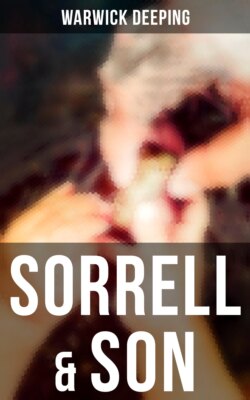Читать книгу Sorrell & Son - Warwick Deeping - Страница 27
На сайте Литреса книга снята с продажи.
2
ОглавлениеAfter tea came the event towards which all the other events of the day had been tending, an exploration of their new world, of this Darien with the Pacific of the unknown beyond it, and floating upon the edge of the unknown Mr. Roland's "Treasure Island,"–the Pelican Inn.
It was Christopher who thought of it as "Treasure Island," and the symbolized nature of the conception was very evident to his father. In the train from Staunton they had had a carriage to themselves, and Sorrell, as though inspired by the hum of the wheels, had talked much of the future. He had been very frank with the boy. He had told him that he regarded the future as Christopher's, and that the Pelican was a place in which he meant to dig for treasure, and to gather money for Kit's education.
"You must have your weapon, Kit. It is no use being able to do nothing but sit on a stool and scribble figures. The thing is to have some sort of knowledge, and a craft which other people can't get on without. Then you are a master. The world has to come and ask you to do something for it. You must be a necessity, not a mere fellow who opens and shuts doors."
Christopher understood much of this but vaguely, but he did understand the nature of his father's sacrifice.
"I am carrying other people's luggage up and down stairs, Kit, in order that your job may be a better one. That's my ambition,–my goal."
And Kit, in the quiet sturdiness of his young and growing consciousness, had begun to realize what manner of man his father was.
The Pelican first showed itself to the Sorrells some three hundred yards beyond the red brick Unitarian church at the end of Lombard Street as something that glittered beside a great mount of trees. The something that glittered proved to be an immense, old-fashioned sign suspended across the road on an overhead beam that was supported by two huge oak posts. Here was the Pelican–that Bird of Piety–glittering for all the world that passed along the road to see, men who went west, and men who went east. Yes, assuredly, Mr. Roland was no fool. The very road itself here had a spaciousness, and the inn–all red and white–with a group of magnificent trees behind it,–looked south over meadowland to the hills beyond. Winstonbury had not splurged in that direction; there were no prawn-coloured villas or post-war bungalows to spoil the English landscape. Moreover, Tom Roland had bought the land on the other side of the road.
Sorrell and his son stood under an immense chestnut tree and absorbed the scene. The leaves of the chestnut were crisped with gold. A dipped holly hedge met the red angle of the building, giving place later to white posts and chains. The building itself was in the shape of an L, and the space between the links of the letter formed a species of court or space, partly flagged and partly gravelled. A white cornice topped the rise of the red walls, and there were dormers in the roof above it, also a copper cupola with a bell. A part of the building draped itself with wistaria and clematis. The main entry had a hooded porch with tall, white pillars. A clipped yew, surrounded by a bright border of flowers and a small, well-mown lawn, broke the open space between the road and the building.
Sorrell saw the beauty of it, for the old inn had a presence, tranquillity. It was like a stately and gracious old lady who could smile on the new age and understand it, and impose upon the new age's restlessness a measure of her own tranquillity. Several cars stood on the broad space behind the posts and chains. Voices came from beyond the holly hedge but they were not unpleasant voices. Green and white curtains fluttered at the windows, and the crisping leaves of the chestnut dappled the road.
"Mr. Roland's no fool," said Sorrell.
Strolling on, he saw the further possibilities of the place, and he pointed them out to Christopher. The Pelican had immense old stables, solidly built, and easily to be absorbed into the inn. They were being used as a garage, but Sorrell imagined that Mr. Roland would lay a jealous hand on all that Georgian brickwork. There was plenty of room for the erection of an up-to-date garage beyond the stables where the noise of the cars would be less troublesome. Sorrell and Christopher strolled into the yard, and beyond it they had a glimpse of a kitchen garden and an orchard, and of a couple of old walnut trees growing in the centre of a little paddock.
Christopher–the boy–had no doubts as to the future of the Pelican. The place had romance. You could imagine yourself leaning out of one of those little dormer windows, and watching people coming and going. The broad road suggested adventure. There were fields and woods, and the hills in the distance. And wild life, rabbits, birds–perhaps a river where you could fish.
He glowed.
"It's a lovely place, pater."
"I think it is. The old Pelican will cast a persuasive eye on people. And Roland? Some people seem to change one's luck."
Returning they had a view of Winstonbury against the sunset, the beeches and the castle mound looking like a huge plumed sable helmet. The spire of the church had a trailing crimson oriflamme attached to it, and all about the town the country lay a bluish green.
"I like this place," said Kit, "and I like Mrs. Garland and our bedroom. Weren't the bacon and eggs good, pater?"
"Very, my son," but Sorrell was thinking of other things.
